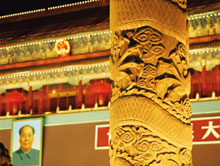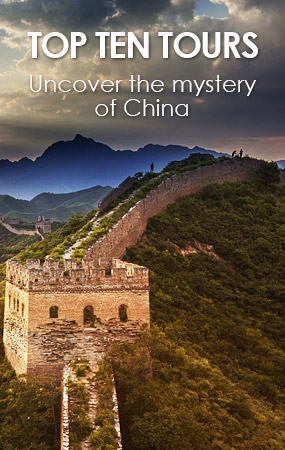Huabiao
Huabiao, as something typical Chinese, is actually an ornamental or symbolic column erected in front of palaces, bridges, city gates, tombs or other places. They used to be made of wood, hence their other name--Huabiaomu. They were difficult to preserve, however, and the Haubiao we see today are mostly made of marble.
 Huabiao functioned originally as a road sign. At the same time they were also used by people to record criticism against the king and ministers. Hence, it was also called feibang mu, or wooden column for criticism. Huabiao emerged long before the Qin Dynasty (221-206 B.C.). With the establishment of monarchical power, Huabiao's function as a criticism media faded, and it also no longer played its role as a road sign. Instead, with carving of dragons and auspicious clouds, it became a pure ornament erected in front of buildings.
Huabiao functioned originally as a road sign. At the same time they were also used by people to record criticism against the king and ministers. Hence, it was also called feibang mu, or wooden column for criticism. Huabiao emerged long before the Qin Dynasty (221-206 B.C.). With the establishment of monarchical power, Huabiao's function as a criticism media faded, and it also no longer played its role as a road sign. Instead, with carving of dragons and auspicious clouds, it became a pure ornament erected in front of buildings.
China has many huabiao left today, but the most distinguished are the two inside and outside of Tian'anmen Gate. Made of marble and carved with dragons and auspicious clouds, each has a wangtianhou, a legendary animal, sitting on it.
The one on top of the column inside the gate is named wangdigui (literally, expecting the emperor to come back soon) implying that the emperor should not stay long outside the palace enjoying the beautiful mountains and water, but should come back soon to deal with state affairs. The one on top of the column outside the gate, with its head turned to the outside, is named wangdichu (expecting the emperor to go out), indicating that the emperor should not indulge himself in the luxurious life inside the palace, but should go our frequently to keep abreast of public sentiment.

